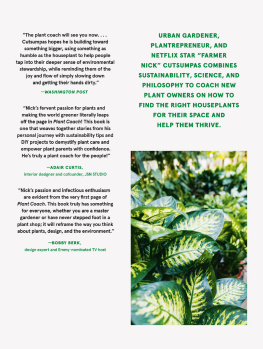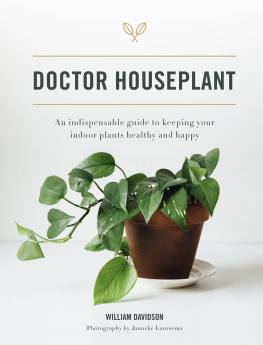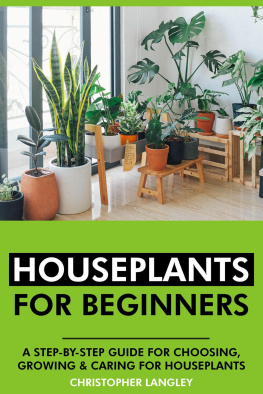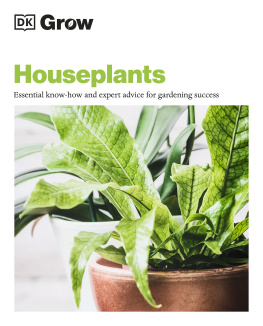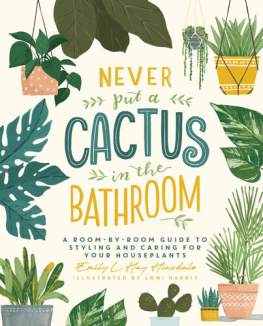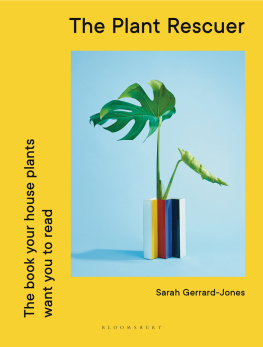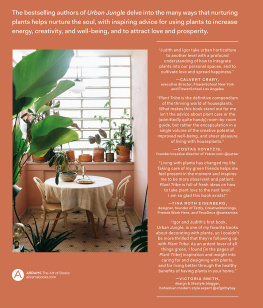Contents
Guide
Page List
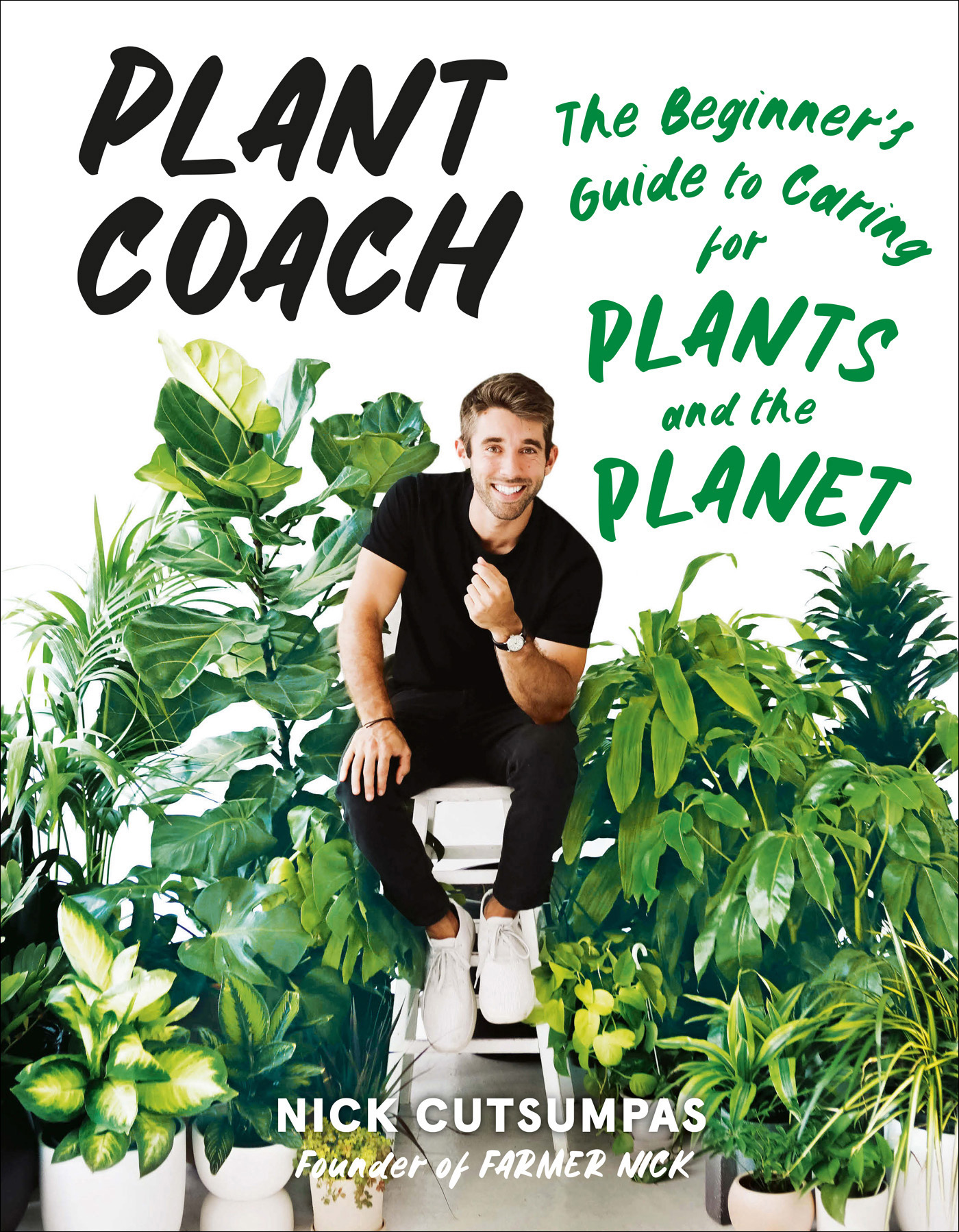
To my grandfather, who I still affectionately call Pou, the first coach I ever had. Thank you for cultivating my love of the outdoors and teaching me how to catch frogs.
To my high school guidance counselor, Guy Matthews, the first person to ever call me coach. May you rest in power.




I have a confession to make: Ive killed many plants. And I still do it every now and then... but far less frequently. There, I said it. And boy does it feel good to get that off my chest.
Its at this point that you are probably having second thoughts about buying a plant-help book from the guy who just admitted to killing his plants, but hear me out.
No, I didnt study horticulture in college, I dont have a PhD in botany, and there are thousands of people with more plant knowledge than me (still not helping my case, I know), but there is a tremendous amount of value and wisdom to be gained through self-exploration and developing a realistic and attainable approach to plant care. Ive already made every mistake there is to make in caring for plants, and learning from that real life trial-and-error was invaluable. You can read every plant textbook in the world, but you will never truly understand a plant until youve worked with it yourself. Until youve teased its roots. Until youve watched a new leaf emerge. Until youve tasted its fruit. Until youve cleaned every leaf and crevice for hours in an attempt to eradicate a horrifying spider mite infestation. Only then can you say that you really know a plant and appreciate its natural process.
Now dont get me wrong. Ive done my fair share of studying, volunteered on farms around the country, built giant plant sculptures, and taken classes at the prestigious New York Botanical Garden, but that doesnt diminish all the insights Ive gained from simply getting my hands dirty. All of these experiences led to the growth of the Farmer Nick social media and plant coaching business, and to date I have coached more than 150 clients as they brought plants into their lives for the first time. Understanding the science of plants provided so much context to the plant behaviors I practiced every day with my clients, and learning the why behind those methods allowed me to craft my own point of view and way of doing things. Sometimes these methods are met with skepticism, but thats totally fine. I dont give two ficus about what another plant parent does or doesnt do. If my plants are flourishing and living up to my expectations, then that is good enough for me.
This notion that there is a single way to take care of your plants is my biggest gripe with the plant community and the main reason I decided to write this book. Caring for plants should not be viewed as this super intensive and scientific endeavor that only the most courageous and scholarly among us can master. Anyone can be a great plant parent, no matter where they live, how busy they are, how many plants they have, and how many plants theyve killed in the past. You dont need fancy light or moisture meters to make your plants thrive. You dont need two hundred-plus plants in your apartment to feel accomplished. And you dont need anyone else telling you there is a single, unquestionable way to care for your plant family. Plants arent black and white. Theyre green!
There is no one size fits all approach to plant care. In fact, the very notion that theres only one way to do it is ridiculous because every plant and environment is different. We dont look at raising humans with a singular approach, because what works for Chad may not work for Brad. Even if they are identical twins (or clones, if we are viewing them through a plant lens), they will have unique personalities and subtle differences in their behavior. The good parents adapt accordingly, while the rigid parents get frustrated, complain, blame their kids, and banish them to the compost pile.
I believe the relationships we build with our plants are not so different from the ones we build with humans. If naming your plants, talking to them, and treating them like a conscious living organism helps you build empathy and makes you a better plant parent, then do it. Its all about finding your plant rhythm and balance, and it takes time to get to know your plants and understand their needs and wants. Like any successful relationship, its all about listening and communication.
So this is my pitch to be your ambassador to the Plant Kingdom: I want to be your botanical middleman, straddling the line between the world of plant science, human psychology, and everyday life and translating the information in a way that you can understand and apply. My goal has always been to be a plant man for the people, and if Im going to do that for the masses, I need to demonstrate how plants can fit seamlessly into our lives without disruption. I understand and appreciate the more extreme plant tendencies some people have, but I recognize that approach doesnt work for all and can even scare people away from plants altogether.
When I began my plant journey, I wanted to find ways to make the plants fit my lifestyle, not the other way around, and I know how overwhelming and daunting it can be. Plant fear and anxiety is real, and believe me when I say some of my clients need professional help coping with their plant trauma, but that shouldnt deter us from taking the plant plunge. With the right coaching, we can all enjoy the beauty and benefits of plants inside and outside of our homes while developing a healthy relationship with the nature around us.
My mission is simple:
This book will empower you with the knowledge and confidence you need to create your own green spaces and inspire regenerative environmental action.
The key word here is confidence. Im going to do everything I can to give you the tools and strategies you need to be the best, most confident plant parent you can be. This book is for the plant realists out therethe green newbies who are afraid to get started, and those who are looking to develop their own personalized plant process. In this green guide, I will share my experiences, my stories, my failures, and my love of all things green. Of course we will throw in some science, but we will also talk about the more mystical side of plants: their purpose; their design; their relationship with humans and the environment.
Its really just a love story, and although I cannot teach you how to love your plants, if youre reading this, theres a strong chance that you already do. It may be the fifty plants in your living room, or the one small succulent on your nightstandit doesnt matter to me. I want to meet you wherever you are on your plant journey and help to relieve some pressure. If you care about the plants, then I am grateful.


